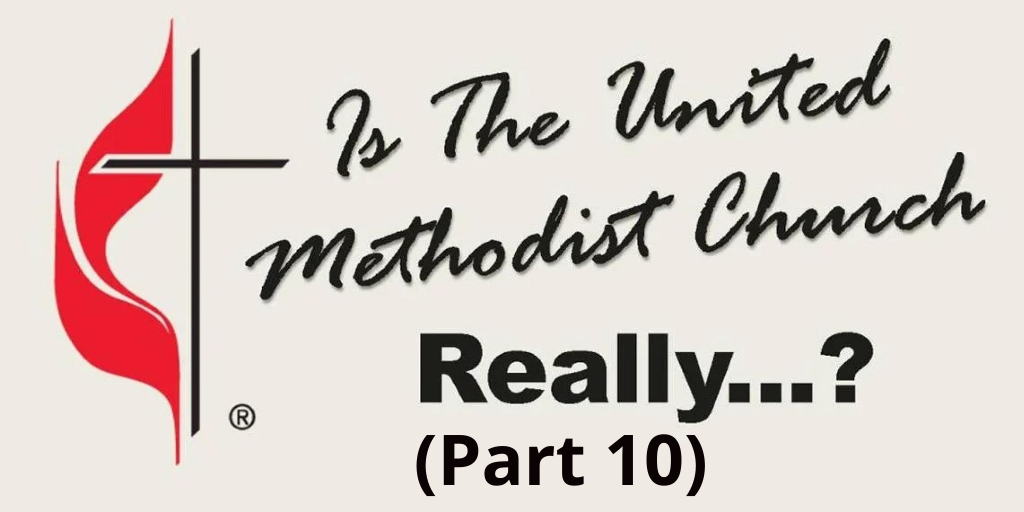
Is The United Methodist Church really? (Part 10)

With some congregations considering leaving The United Methodist Church or just wondering about its future, Ask The UMC offers a series of questions and answers to help clear up some common misperceptions or misinformation around disaffiliation. Graphic by Laurens Glass, United Methodist Communications.
At Ask The UMC, we continue to answer questions from congregations wondering about the future of The United Methodist Church, whether they should consider disaffiliating from it, and what happens if they do.
This is the tenth of a series of articles offering factual responses to questions we are receiving. This article addresses whether a re-vote on disaffiliation is allowed, whether United Methodist seminaries teach doctrines contrary to those of The United Methodist Church, whether local churches will be compelled to host same-sex weddings, and whether The United Methodist Church endorses critical race theory. All of the articles in the series are available here.
We welcome your questions and invite you to contribute to future articles in this series by sharing what you are hearing about the process of disaffiliation or the future of The United Methodist Church. Write to AskTheUMC@umc.org.
Is The UMC really…?
33. Allowing congregations to re-vote if their church conference vote to request disaffiliation failed to reach the mandatory two-thirds majority?
For the most part, no.
The Book of Discipline does not provide for a re-vote on this question. Exceptions may be made at the discretion of the district superintendent if there is evidence that an irregularity in the process of the original vote may have led to a different outcome.
A failed disaffiliation vote is generally the worst of all possible outcomes. The failed vote tends to create angry and hurting people on both sides, more of whom are likely to leave the church, or simply drop out, than if no vote had happened or if the motion to request disaffiliation had prevailed. Those who do not leave often feel demoralized as they watch the fallout of the failed vote unfold. Asking a congregation in this condition to hold another vote is more likely to increase polarization, dropouts and departures than bring the resolution those asking for a vote may seek.
So as hard as a failed vote is on a congregation, there is wisdom in the fact the Discipline does not provide for a re-vote on this matter.
If your congregation has experienced a failed re-vote, seek support from your district superintendent and conference staff to find pathways toward healing, reconciliation and, in time, renewed focus on the mission of the congregation that remains.
34. Teaching things in its seminaries that are contrary to the doctrinal standards of The United Methodist Church?
Yes, but not to undermine United Methodist doctrinal standards.
Indeed, the reason for doing this is exactly the opposite.
In the real world where United Methodist church members live, all kinds of beliefs, including some that are contrary to the doctrinal standards of The United Methodist Church, not only exist but are strongly defended by their advocates. Those preparing to be clergy in The United Methodist Church need to know that other doctrines exist, what they are, and how to articulate and support United Methodist doctrines in the face of them so they can help those they serve do the same.
35. Going to require local churches to host same-sex weddings? What if their appointed clergy are allowed to and willing to do so?
No. And no.
There are no proposals before the next General Conference to require local congregations to host same-sex weddings or union ceremonies, not even if their appointed clergy are permitted and willing to do so. Existing proposals would allow clergy to choose about presiding and congregations to choose about hosting, but neither would have control over the other’s choices.
36. Endorsing critical race theory or about to endorse it?
No. The United Methodist Church has never made any statements about critical race theory. Nor have any such statements been submitted for consideration by the next General Conference (2024).
The United Methodist Church has stood firmly against the sin of racism in all its forms (interpersonal, corporate and systemic) from its founding in 1968. These commitments pre-date the development of critical race theory in law school curricula beginning in the 1980s.
RESOURCES:
#BeDakotasUMC: Access videos, graphics, and other resources to help all congregations navigate this time of discernment and to provide care and support for pastors, congregations, and individuals as they wait out or go through this process.
United Methodist Foundational Documents:The Bible, The denomination’s Articles of Religion and Confession of Faith, The writings and sermons of John Wesley, The General Rules of the Methodist Church, The UMC – Mission Statement (Book of Discipline), The UMC – General Church Structure, The UMC – Our Social Principles, The UMC – Our Christian Beliefs, The UMC – Sacraments